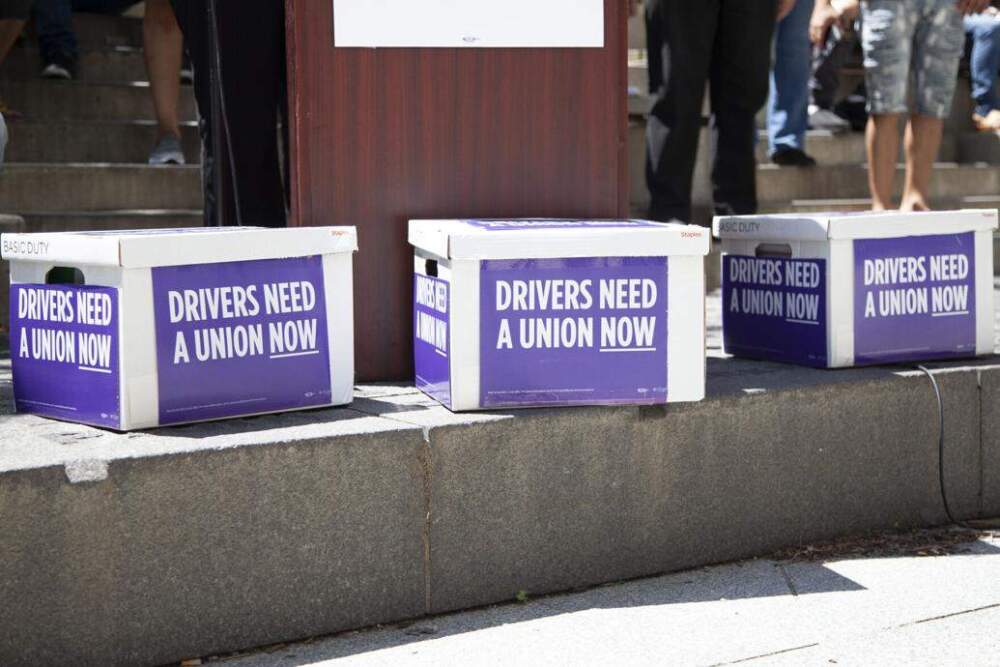Advertisement
Uber, Lyft drivers file signatures to put rideshare unionization on the ballot

Uber and Lyft drivers who want the ability to organize and the union bosses who back them will press the decision into voters' hands this fall, pushing for collective bargaining rights as a necessary addition to gains secured in a legal settlement.
Days after Uber and Lyft agreed to boost driver pay and offer new benefits to resolve a years-old lawsuit, campaigners moved Tuesday to place on the ballot a measure that would allow those same drivers to unionize.
The labor-backed Drivers Demand Justice coalition filed the final voter signatures needed for its ballot question, effectively confirming they are ready to embark on four months of campaigning behind a proposal that hesitant lawmakers decided not to touch.
Campaign leaders for months were optimistic about the prospect of a legislative solution that would avert the need to go to voters. But with no action on Beacon Hill and Wednesday representing the deadline to secure a spot on the ballot or give up for another two years, organizers "ran out of time," according to coalition leader Mike Vartabedian.
"I appreciate all the work the lawmakers did on this. It's a complicated and complex problem. But we really have 'til tomorrow to turn these signatures in, and there's nothing going to be finalized or done by tomorrow," Vartabedian, assistant directing business representative of International Association of Machinists and Aerospace Workers' Massachusetts Union District 15, told the State House News Service. "We really feel like we have no choice. We have to do this for these drivers and get them the right to a union."
Roughly 200 drivers rallied on a sun-baked plaza outside Secretary of State William Galvin's office, where they simultaneously praised the settlement Attorney General Andrea Campbell struck with Uber and Lyft and described it as insufficient.
The agreement unveiled Thursday requires the companies to pay drivers at least $32.50 per hour for the time from accepting a ride to dropping off a passenger, and also provide paid sick leave, occupational accident insurance and access to health benefits. The companies will also pay $175 million, most of which will become restitution for drivers.
Lyft driver Jin Gao said through an interpreter that the settlement is an "encouragement" but still "not enough."
"The workers need a right to collectively bargain to determine their future and to have a seat at the table with these companies," said Roxana Rivera, assistant to the president of 32BJ SEIU and another coalition leader. "These companies continue to evolve very quickly, and this directly impacts drivers. They want a voice in all those changes going forward. They want to have a voice in improving their working conditions going forward."

Uber, Lyft, DoorDash and Instacart for years had been pursuing their own ballot question that would define drivers as independent contractors instead of employees, but they ended their campaign in the wake of the settlement. Now, the unionization measure will be the only app-based driver question decided by voters this fall.
Vartabedian said he thinks the ballot should now be "less confusing" without two intertwined, complex driver-related proposals for voters to decide at once.
Campbell, who previously certified both measures as fulfilling constitutional requirements to be eligible for the ballot, on Tuesday threw her official support behind the driver unionization proposal.
"Our settlement with Uber and Lyft secured an unprecedented package of minimum wage, benefits and protections for workers. It's a strong foundation that can and should be built upon," Campbell said in a statement provided by the Drivers Demand Justice Coalition. "I'm proud to support this ballot question, which if passed, would empower and allow workers to collectively bargain for even greater pay and benefits."
Advertisement
It's not yet clear how much campaign help the group will get from other unions besides 32BJ SEIU and IAM. Before the Uber and Lyft settlement reshaped the landscape, labor groups were split over the best approach to protect drivers.
Massachusetts AFL-CIO President Chrissy Lynch signaled Tuesday that her group thinks drivers should now gain the right to unionize, but stopped short of indicating whether the linchpin organization would lend its aid on the ground during campaign season.
"We strongly agree with the Drivers Demand Justice campaign that app-based drivers should have the right to unionize," Lynch said in a statement to the State House News Service. "Our Executive Council is currently going through an internal, democratic endorsement process for their ballot campaign, like we do with all ballot questions."